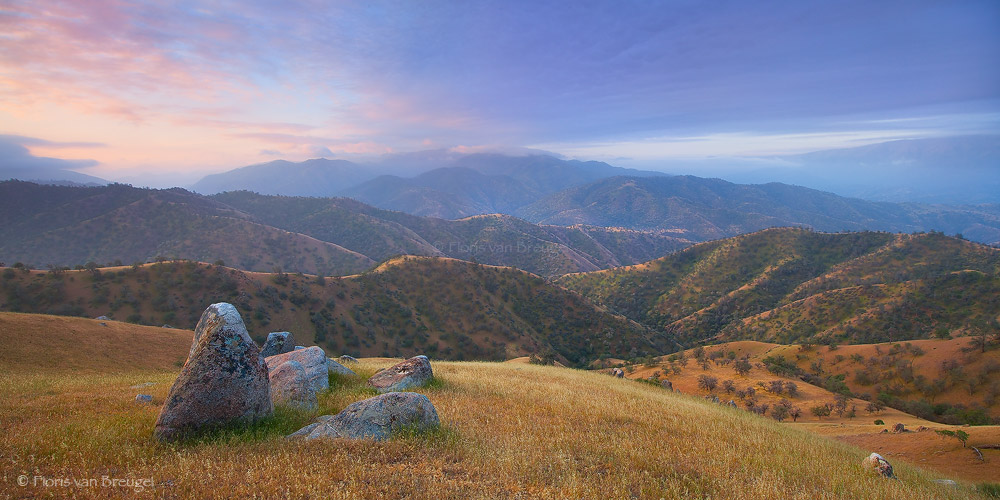It’s late afternoon. The foothills are astoundingly clear after raining all night and morning. A few lines of gray and white cumulus hover over the hills, like stationary waves crashing upon a fluid shore.
When I arrive on the bike at the swollen stream, the beauty is so intense I stand agape for a minute. At that moment, and for less than a minute, the clouds have thrown the large saddle-like entrance into the canyon beyond town into deep shadow, while the rest of the green foothills shimmer in the last hour of full sunlight.
Someone has thrown a slab of lumber, about 8 inches thick and two feet long, off to the side. Since even with pads and plastic, the ground is too damp to sit on, it makes a perfect little platform for today’s meditation. On the short, shallow slope down to the creek thick bunches of poppies, with fat buds are about to burst open. They’ll soon cover the area in bright orange.

Experiencing the actuality of communion with the numinous is immeasurably more important than any description or philosophy about it, however lyrical or intellectually persuasive.
As humans, we put the word before the thing because we are creatures of symbol. As emergent human beings, we realize, even if we need to be reminded again and again, that the word is not the thing, and preclude experiencing the thing when primary.
Anyone who has spent a few days in the wilderness, especially alone, realizes that nature doesn’t give a whit whether you live or die, eat or get eaten. At the same time however, anyone who has spent a few days in the wilderness, especially alone, realizes that nature is suffused with an ineffable mystery and inviolability.
Reconciling this apparent contradiction is one of the most difficult tasks of philosophers, and any serious human being. Can the wordless experiencing of the silent vastness of Mind come before any verbal or philosophical conception?
Though I don’t subscribe to the dictum, “those who say don’t know, those who know don’t say,” words do fail when it comes to mystical experiencing. Even so, a love of language has its place.
The conundrum of language aside, bringing the awareness and presence of the numinous into one’s life in society is much more difficult than experiencing intimations of the sacred alone.
Having both a strong mystical and philosophical bent (I know, that word can be taken two ways), my life’s goal has been to be as fully realized as one can be in this lifetime, and develop a philosophy that makes mystical experiencing understandable and open to any serious person.
Both are an art, not a science, though science has its place. My favorite science writer on human evolution is the paleoanthropologist Ian Tattersall. He’s exhibits much insight into what makes humans different from other animals, and how we came to be the strange primates that we are. But he’s not a philosopher, and rather runs aground on the deeper questions (not that philosophers, including this one, don’t as well).
Consider this passage from Tattersall’s book, “Becoming Human”:
“We can derive no concepts of morality (a social construct) or of ‘natural law’ (an intellectual construct) from the contemplation of nature…for nature is simply indifferent to individual suffering or success, and to call such indifference amoral would be simply to anthropomorphize.”
“Thus, while I passionately believe that any moral system is deeply flawed that does not start from the proposition that the individual is the unit of suffering, I have to recognize that I can find no justification for this notion in anything that lies beyond the human milieu (or perhaps my own perception of it).”
Tattersall’s focus on “individual suffering,” and his humility regarding whether there is compassion beyond “the human milieu” is evocative and provocative.
The question remains unasked however: Given that nature is completely indifferent to individual survival and suffering, what relationship, if any, does cosmic intelligence, which one communes with in the wilderness or deeper states of meditation, have to the human condition?

The easy answer is none. But in the moments when one ceases being a dividual, and is a true in-dividual (that is, an undivided human being rather than a divided human), one feels an impersonal love and compassion, emanating from beyond the “human milieu,” for what the poet Robinson Jeffers calls “this poor doll humanity.”
There is a feeling that man’s consciousness has come to its logical, totally fragmenting end. Whether humanity will have another chance at some unforeseeable future juncture to radically change and change course I don’t know. But this is it for this age.
The meditative state is complete, and stands alone. But besides the necessity of protecting and nurturing it, it brings with it a tremendous seriousness about the human condition in the present, and for the future of humanity.
Martin LeFevre

